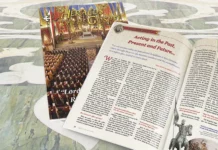After original sin, our capacity to relate to the spiritual world needs to be “awakened” and “educated” by the Angels. They help us to make up for our deficiency and learn a higher “language”.

What must be the experience of someone who has never had the sense of sight? Or of a person whose ear has never detected any sound and who, as a consequence, is not able to communicate fluently with others? Have you ever imagined yourself in this situation?
Well, we actually face a similar situation… Similar? Yes, and I do not hesitate to say worse, for the blindness, deafness and dumbness from which we suffer are all the more detrimental for being violently opposed to our nature.
Composed of body and soul, “man occupies a unique place in creation,” since “in his own nature he unites the spiritual and material worlds,”1 which in him are raised by grace to participation in the divine life. This harmonious synthesis, however, was ruptured after original sin, setting up a struggle between the spirit and the flesh (cf. Rom 8:23), leaving us blind to the supernatural, deaf to the voice of Heaven and mute in our communication with the Most High… How to remedy such a disaster?
The story of an American woman of the last century can help us to better understand the consequences of this “blockage”, as well as the “remedy” prepared in advance by Divine Providence so that men could somehow recover the primitive alliance between the material and spiritual worlds.
Buried in solitude
Helen Adams Keller was born on June 27, 1880, in Tuscumbia, Alabama. Her first eighteen months of life were those of an entirely normal child, until a “brain fever”, the diagnosis made at the time, irreparably deprived her of her senses of sight and hearing. As a consequence, she grew up isolated from the outside world.
Helen became so accustomed to silence and darkness that she thought everyone lived that way. However, this impression did not spare her from extreme vexations and unhappiness, even though she was still very young and unable to comprehend the feeling of emptiness in the depths of her soul.
Gifted with an uncommon intelligence, Helen began to notice that there was a difference between her and others. She later recounted: “I had noticed that my mother and my friends did not use signs as I did when they wanted anything done, but talked with their mouths. Sometimes I stood between two persons who were conversing and touched their lips. I could not understand, and was vexed. I moved my lips and gesticulated frantically without result. This made me so angry at times that I kicked and screamed until I was exhausted.”2
A teacher gives direction to the girl’s life
Concerned about their daughter’s emotional stress and increasing aggressiveness, her parents, Colonel Arthur Keller and Kate Adams Keller, looked for someone capable of “taming” the child. It was then that they found Anne Sullivan. Only twenty years old and visually impaired, the young teacher had just left the same school where Laura Bridgman had been educated; a famous deaf-blind girl whose example of life gave the couple hope.
March 3, 1887 was, therefore, for Helen, the “most important day I remember in all my life.”3 It was the beginning of an educational process which, with untiring perseverance and diligence on the part of her teacher, would teach the girl to overcome her disabilities and conquer goals that no one would dare to imagine.
About her beloved teacher, she would comment: more than “lifting the tyrannical veil that hid from me all the beautiful things in the world, […] [Anne] would love me with the holiest love, the most intense tenderness and the deepest dedication that anyone has ever had for another person on earth.”4
Thus, under Miss Sullivan’s daily direction, Helen succeeded, in time, in making up for her sensory deficiencies to an incredible degree and developing almost all the ordinary human skills.
One day, as they strolled through the garden, Anne took her apprentice to the well and primed the pump to make water gush into the mug the child was carrying. As the liquid began to overflow onto her hand, the teacher repeatedly wrote the word “water” on her other palm. This awoke in the little girl the link between the cool element and the sign being traced on her hand, forming in her mind the concept of water.
By this method, over the course of years, Anne Sullivan widened the horizons of Helen’s world, opening new panoramas before her; and through the student’s complete trust in her governess, she quickly made substantial strides in learning.
“As my knowledge of things grew, I felt more and more the delight of the world I was in,”5 Helen recalled.
Eventually, she learned to speak, feeling her instructor’s lips and jaw, assimilating the movements and producing similar vibrations. In this way, she mastered not only English, her mother tongue, but also German and French with considerable fluency. And although her vocal intonation was somewhat hoarse and raspy, due to the absence of auditory experience, her German pronunciation was excellent, while her French diction was even more intelligible than her English.
She read many books in Braille and even wrote several works, of encyclopaedic size, using a typewriter designed specifically for the blind, with great perfection and skill.6
A teacher’s dedication, a student’s confidence

All of this was only possible for Helen because she allowed herself to be guided by the meticulous and indefatigable diligence of a person who fully participated in a world hitherto unknown to her. In this way, Anne Sullivan was able to translate the universe to her student’s limitations, making it visible to her blindness, perceptible to her deafness and an interlocutor to her muteness.
The confidence, gratitude and acknowledgement she harboured for Anne Sullivan, is clear in Helen’s autobiography: “My teacher is so near to me that I scarcely think of myself apart from her. How much of my delight in all beautiful things is innate, and how much is due to her influence, I can never tell. I feel that her being is inseparable from my own, and that the footsteps of my life are in hers. All the best of me belongs to her – there is not a talent, or an aspiration or a joy in me that has not been awakened by her loving touch.”7
An Angel that “educates” us in the supernatural
As with Helen before the arrival of her teacher Anne, our efforts to fill the emptiness of our soul by ourselves always bring us a tedious and restless discontent.
Seeing ourselves trapped in our own insufficiency, overwhelmed with the troubles and concerns that daily assail us, we must acknowledge that we need an aid that will unite us with the supernatural. And no one can provide us with this aid more effectively than our good Guardian Angel.
By his mere presence, the Angel is able to rectify a number of ways of seeing, feeling and understanding, which a person has acquired due to sin – a set of pre-conceived and erroneous ideas which his influence can eliminate. This renders the battle for sanctification much more feasible, by clearing away many of the impasses, pitfalls and surprises that normally encumber us.
In appointing him as our Guardian, God bestows upon us a guide, a tutor and a friend, responsible for our salvation. He accompanies us at all times, protecting us, orienting us and uniting us to Heaven.8 God created him having in mind the person who would be his charge, and for that reason a close and entirely unique consonance is established between guardian and protégé.
But how often do we forget these best friends of ours, showing an unwilling attitude towards their inspirations, and preferring to listen to our carnal appetites rather than mould ourselves to the sublime outlook to which they call us… Nevertheless, like archetypal “Sullivans”, they never stop trying to win our confidence and friendship; on the contrary, they only redouble their care in our regard.
Let us recall Helen’s words about her teacher, and we will see how applicable they are to our Guardians: “[They love us] with the holiest love, the most intense tenderness and the deepest dedication that anyone has ever had for another.” One of their greatest desires is to be fully free to act upon us, which they obtain only with our consent and collaboration.

We ought, therefore, to be faithful and docile to them, having recourse to them at all times. Our capacity to relate to the supernatural must be “awakened” and “educated” by our Angels. To learn the “language” of the higher world we must make use of this “tactile” method to make up for the deficiency of the senses affected by original sin.
Let us allow our Angels to guide us!
When we open ourselves to the salutary influence of our heavenly guardians, they make our souls into receptacles of grace. Moreover, they polish our supernatural senses, making them keen to perceive God’s designs and enabling us to analyse everything that happens around us from the perspective of wisdom.
To enjoy these benefits, let us recollect ourselves and ask for the help of our angelic protector, who will hasten to our side to attend to us and free us from earthly ties and infernal snares, lifting up our minds and hearts.
Let place our trust in these dear friends of ours so that, when we complete our earthly course and reach the end of life’s arduous battle, we may live with them, without veils, for all eternity! ◊
Notes
1 CCC 355.
2 KELLER, Helen. The Story of My Life and Selected Letters. New York: Doubleday, 1954, p. 28.
3 Idem, p. 34.
4 KELLER, Helen; MACY, John (Coord.). A história de minha vida. 2.ed. Rio de Janeiro: José Olympio, 1940, p.17., p.29.
5 KELLER, op. cit., p.37.
6 Cf. Idem, p. 224.
7 Idem, p. 47.
8 On the spiritual and material benefits that Guardian Angels bestow on their charges, see: ROYO MARIN, OP, Antonio. Dios y su Obra. Madrid: BAC, 1963, p.412-413.







